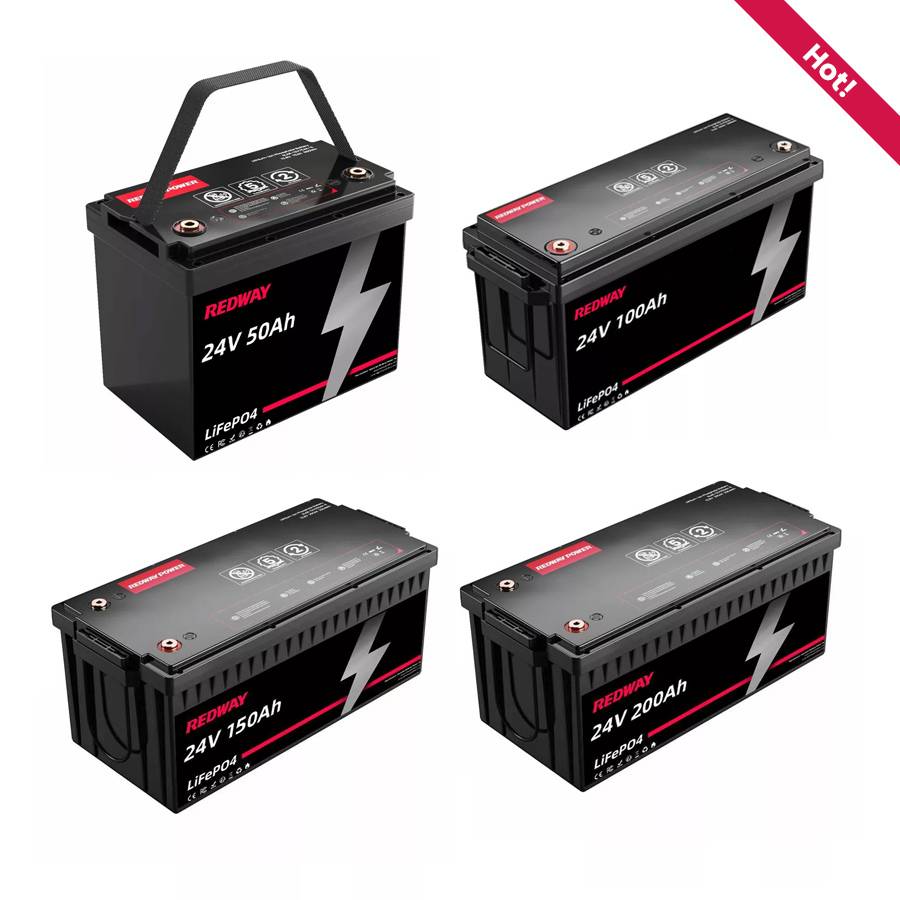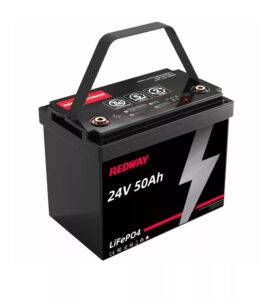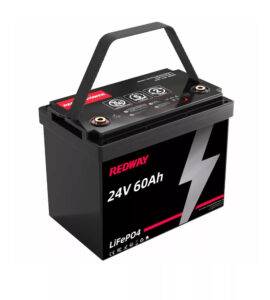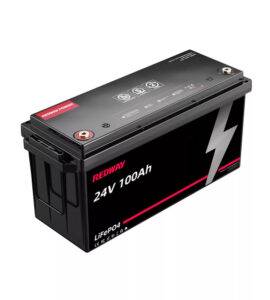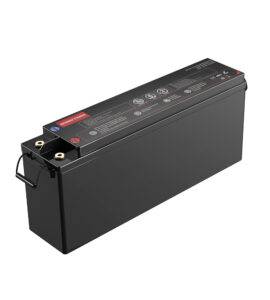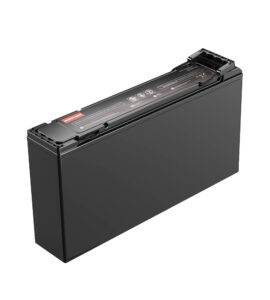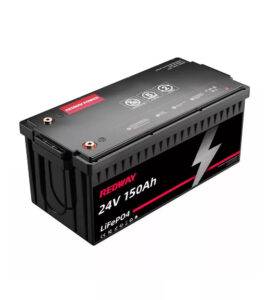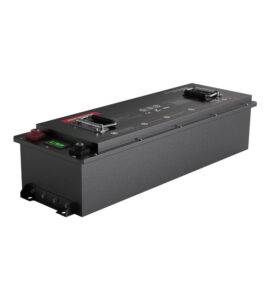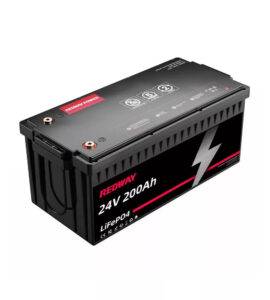24V Lithium ion Battery Factory Wholesale
24V Lithium ion Battery, One-Stop Solution
Redway Power comprehensive range of 24V Lithium Batteries, your ultimate one-stop solution for reliable power. Crafted with precision, our 24V lithium batteries offer high energy density, extended lifespan, and a lightweight design, ideal for professional and consumer-grade flashlights.
Redway Power's commitment to portability and convenience ensures dependable and long-lasting solutions for various applications. Our 24V lithium batteries are designed to be trustworthy light sources for outdoor activities, emergencies, and professional use. Experience advanced power solutions with Redway Power, your trusted partner for 24V Lithium Batteries.
Your Trusted 24V Lithium Battery Manufacturer
What is the wholesale price of lithium battery?
You can click contact us or phone call us. We will give you multiple options of price.
Is Redway Power a trading company or factory?
Redway Power is a company with its own factory, integrating research, development, production, and sales.
How about the quality of Redway's LiFePo4 Battery product?
Redway Power boasts over 12 years of experience in LiFePO4 battery production and is an authorized supplier for CATL and BYD.
Can you do an OEM/ODM project?
Yes, we have engineers available to assist in designing and developing any related products.
What’s your MOQ?
MOQ varies according to battery voltage and capacity.
What payment terms can we accept?
We accept TT/Paypal/West Union, etc.
24v Lithium Ion Deep Cycle Battery Knowledge
Discover the features and benefits of 24V lithium-ion deep cycle batteries. These rechargeable batteries are ideal for marine systems, RVs, and renewable energy applications. With a lightweight design and high energy density, they provide long-lasting power. Their ability to withstand repeated deep discharges ensures reliable performance.
How Are 24V Lithium-ion Batteries Advantageous Over Other Types?
- High Energy Density: 24V lithium-ion batteries can store a large amount of energy in a compact and lightweight structure. This makes them advantageous for applications where space and weight are critical factors.
- Longer Cycle Life: Lithium-ion batteries have a longer cycle life compared to many other battery types. They can withstand numerous charge and discharge cycles, providing reliable power over an extended period.
- Reliable Power Output: 24V lithium-ion batteries can operate for a longer time, ensuring continuous and reliable power delivery regardless of the device or application.
What Is the Typical Lifespan of 24V Lithium-ion Batteries?
- Lifespan: The typical lifespan of a 24V lithium-ion battery ranges from two to three years or 300 to 500 charge cycles, whichever comes first.
- Charge Cycles: One charge cycle refers to a complete discharge and recharge of the battery, impacting the overall lifespan.
- Factors Affecting Lifespan: Usage patterns, charging habits, and operating conditions play a role in determining the actual lifespan of the battery.
How Should One Handle 24V Lithium-ion Batteries Safely?
- Storage Conditions: Store batteries in a well-ventilated, dry area within a temperature range of 40 to 80 degrees Fahrenheit. This helps maintain battery performance and prevents potential hazards.
- Protection from Environmental Factors: Keep batteries away from direct sunlight, heat sources, and water to avoid damage and potential safety risks.
- Proper Stacking and Handling: Stack batteries securely to prevent them from being bumped or knocked over, reducing the risk of physical damage.
- Charging and Disposal: Never charge disposable lithium or alkaline batteries, as they are not designed for recharging. Additionally, dispose of batteries properly according to local regulations to minimize environmental impact.
What Factors Should Be Considered When Selecting 24V Lithium-ion Batteries?
- Capacity and Voltage: Consider the battery’s capacity, which determines the amount of energy it can store, and ensure compatibility with your device’s voltage requirements.
- Cycle Life and Depth of Discharge (DoD): Evaluate the battery’s cycle life, which refers to the number of charge and discharge cycles it can withstand, and the recommended depth of discharge for optimal performance.
- Power Rating and Safety Features: Assess the battery’s power rating to ensure it can meet the power demands of your application. Additionally, consider the presence of safety features such as overcharge and over-discharge protection.
- Manufacturer Reputation and Budget: Research the reputation and reliability of the battery manufacturer. Compare prices and consider your budget while ensuring that the battery meets your specific requirements.
How Should 24V Lithium-ion Batteries Be Disposed of with Environmental Consciousness?
- Recycling and Collection Points: Take 24V lithium-ion batteries to separate recycling or household hazardous waste collection points. This ensures proper disposal and prevents environmental harm.
- Terminal Taping: To prevent fires during transportation and storage, tape the battery terminals using non-conductive tape. This precautionary measure reduces the risk of accidental short circuits.
- Proper Recycling: Ensure the batteries are properly recycled to prevent environmental contamination. Consult local recycling centers or retailers for safe disposal options. Recycling helps recover valuable materials and reduces the environmental impact of battery waste.
What Are the Differences Between Various Models of 24V Lithium-ion Batteries?
- Capacity and Chemistry: Different models of 24V lithium-ion batteries offer varying capacities and chemistries, affecting factors like energy density and cycle life.
- Size, Weight, and Voltage Stability: Battery models may vary in size, weight, and voltage stability, depending on the intended application. Consider these factors based on your specific requirements.
- Performance Characteristics and Features: Each battery model may have unique performance characteristics and features, such as safety mechanisms, fast-charging capabilities, or compatibility with certain devices.
How Should 24V Lithium-ion Batteries Be Stored for Optimal Condition?
- Temperature Range: Store the batteries within a temperature range of 35 to 90 degrees Fahrenheit. This helps preserve the battery’s performance and prevents potential damage.
- Charged State: Store the batteries in a charged state, maintaining a voltage above 2.5V. This prevents the batteries from breaking down and decomposing over time.
- Regular Recharging: Recharge the batteries every 12 months to prevent capacity loss. This ensures that the batteries remain in good condition and ready for use.
- Humidity Control: Maintain a humidity level of around 50% for safe storage. Controlling humidity helps prevent corrosion and other potential issues.
What Customization Options Exist for Redway Custom 24V Lithium-ion Batteries?
- Capacity Adjustment: Redway offers capacity adjustment to tailor the battery’s energy storage capacity to the specific needs of the application.
- Size Customization: Size customization allows the battery pack to be designed according to the available space and installation requirements.
- Mounting Options: Redway provides mounting options, such as rear rack, frog, down tube, and soft pack configurations, to accommodate different installation scenarios.
How many solar panels do I need to charge a 24V 100Ah battery?
When it comes to charging a 24V 100Ah battery using solar panels, the number you need can vary depending on several factors. The wattage output of your panels, sunlight exposure, and efficiency all play a role in determining how many panels are required for optimal charging.
Typically, a rule of thumb is to match the wattage of the solar panels to the voltage of the battery. For a 24V battery, you may need around four 100W solar panels to efficiently charge it. However, this is just an estimate, and actual requirements may differ based on individual circumstances.
It’s essential to consider not only the number of panels but also their positioning and angle towards the sun for maximum energy absorption. Consulting with a professional or using online calculators can help determine the precise number needed for your specific setup.
What is the lifespan of a 24V lithium battery?
Curious about the lifespan of a 24V lithium battery? Let’s dive in. Lithium batteries are known for their durability and longevity, outlasting traditional lead-acid batteries by leaps and bounds. The lifespan of a 24V lithium battery can vary depending on factors like usage patterns, charging practices, and environmental conditions.
On average, a well-maintained 24V lithium battery can last anywhere from 5 to 15 years or even longer. Proper care and regular maintenance can help extend the lifespan of your battery significantly. Some manufacturers even offer warranties that guarantee a certain number of cycles or years of service.
It’s essential to follow the manufacturer’s guidelines for charging and discharging to ensure optimal performance and longevity. By treating your 24V lithium battery with care and attention, you can maximize its lifespan and get the most out of your investment.
How long does it take to charge a 24V 100Ah lithium battery?
Charging a 24V 100Ah lithium battery can vary in time depending on several factors. The charging speed is influenced by the charger’s output current and the battery’s state of charge.
On average, it may take around 5-8 hours to fully charge a 24V 100Ah lithium battery using an appropriate charger. However, some high-power chargers can significantly reduce this charging time.
It is essential to use a compatible charger with the correct voltage and current settings to ensure safe and efficient charging. Overcharging or undercharging can affect the battery’s lifespan and performance.
Monitoring the battery during charging is crucial to prevent overheating or overcharging, which can lead to safety hazards. It is recommended to follow manufacturer guidelines for optimal charging times and procedures.
Understanding the factors that influence charging time is key to efficiently maintaining your 24V 100Ah lithium battery for long-lasting performance.
What voltage should a 24 volt battery read when fully charged?
When it comes to a 24V lithium battery, knowing the correct voltage reading when fully charged is crucial for optimal performance. A fully charged 24 volt battery should ideally read around 27-28 volts. This slight increase accounts for the voltage rise that occurs during charging and ensures that the battery is truly at full capacity.
Monitoring the voltage of your 24V battery is essential to prevent overcharging or undercharging, both of which can negatively impact its lifespan and efficiency. By regularly checking the voltage levels, you can maintain your battery’s health and maximize its longevity.
Different types of chargers may have slightly varying voltage readings when the battery reaches full charge. It’s important to refer to the manufacturer’s guidelines or specifications to determine the exact voltage range for your specific 24 volt lithium battery model.
By understanding and monitoring the ideal voltage range for a fully charged 24V lithium battery, you can ensure that it operates efficiently and reliably whenever you need it most.
Who is the largest manufacturer of LFP batteries in 2024?
The largest manufacturer of LFP batteries in 2024 is a company that has been making significant strides in the industry. With cutting-edge technology and innovative solutions, they have cemented their position as a leader in lithium-ion battery production.
Their commitment to quality, sustainability, and performance has set them apart from competitors. By focusing on research and development, they continue to push boundaries and set new standards for energy storage solutions.
Customers worldwide trust this manufacturer for reliable products that meet their needs effectively. As the demand for lithium-ion batteries continues to rise, this company remains at the forefront of providing top-notch solutions for various applications.
In 2024, the largest manufacturer of LFP batteries stands tall as an industry powerhouse with a global reach. Their dedication to excellence ensures that they remain a key player in shaping the future of battery technology.
Are any lithium batteries made in the USA?
When it comes to lithium batteries, the question of where they are manufactured is an important one. In recent years, there has been a growing interest in domestically produced goods. Many people wonder if any lithium batteries are made in the USA.
The good news is that there are indeed companies manufacturing lithium batteries right here in the United States. These companies have invested in cutting-edge technology and processes to ensure high-quality products that meet industry standards.
By producing lithium batteries locally, these manufacturers not only support the American economy but also reduce carbon emissions associated with transportation from overseas suppliers. This aligns with the increasing focus on sustainability and environmental responsibility within the energy storage industry.
As demand for lithium batteries continues to rise, having domestic production capabilities provides a strategic advantage for American businesses and consumers alike. It’s reassuring to know that options exist for sourcing lithium batteries made in the USA.
What should the lithium charge settings be for 24V?
When it comes to 24V lithium ion batteries, ensuring the correct charge settings is essential for optimal performance and longevity. The recommended charge settings for a 24V lithium battery typically include a voltage limit of around 29.4 volts during charging and a cutoff voltage of approximately 20 volts when discharging. It’s crucial to follow the manufacturer’s guidelines closely to prevent overcharging or discharging, which can damage the battery and shorten its lifespan.
As technology continues to advance, staying informed about the latest developments in lithium ion batteries is key to maximizing their efficiency and durability. With proper care and maintenance, a 24V lithium battery can provide reliable power storage for various applications while contributing to sustainable energy solutions. So remember, always prioritize safe charging practices and adhere to recommended charge settings for your 24V lithium ion battery!


